Book Review & Interview | My Beer Year
My Beer Year: Adventures with Hop Farmers, Craft Brewers, Chefs, Sommeliers, & Fanatical Drinkers as a Beer Master in Training by Lucy Burningham (Roost Books, 2016)
In her book My Beer Year, Portland-based journalist Lucy Burningham chronicles her time preparing for the Certified Cicerone exam. She presents herself as a novice early on (though she clearly knew more even then than the average beer drinker), and the book covers the year or so she spent gaining more knowledge and experience.
During her preparation, Burningham took an off-flavor exam with Master Cicerone Nicole Erny, sat in on a tasting panel at Widmer Brothers Brewing, visited hop farmers in Washington state during the hop harvest, toured Belgium by car, attended the Great American Beer Festival, brewed a pale ale in a parking lot with some like-minded women, tagged along for a Breakside Brewing brew day and helped out at Hair of the Dog on a draft system cleaning. My Beer Year is quite a tour of the American beer scene, and, while not every project Burningham undertook was strictly speaking necessary in order to take the exam, the behind-the-scenes view Burningham gives us into some of these circles is fascinating and informative.
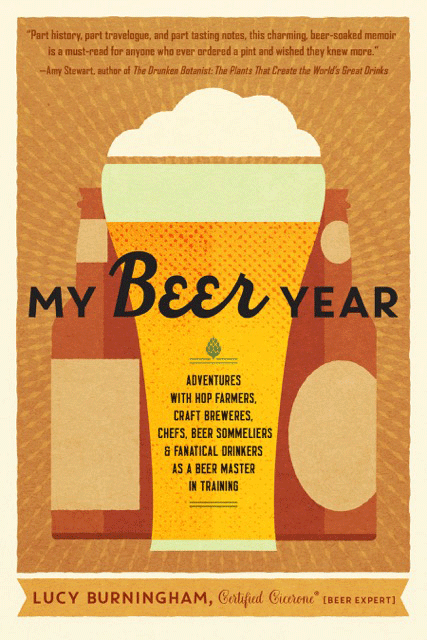
I read My Beer Year before taking the Cicerone exam myself last February (I passed!), so the most informative part of the book for me was contained in the final chapters, in which Burningham tells us about the day of her Cicerone exam. Those sitting for the test have to sign agreements promising not to discuss the details of the exam with anyone, but the general info Burningham provides about the format and flow of the day still helped to calm my nerves. Cicerone candidates might find this book worth it for these final chapters alone.
Burningham displays a remarkable level of candor and humility throughout My Beer Year, with an open-faced honesty about the wealth of beer knowledge she needed to gain before her exam (spoiler: she gained it, and passed). This is rare in beer books, which usually carry an authoritative and omniscient tone that can come across as condescending (is this because so many of these books are written by men?) and make gauging one’s own learning level difficult. Burningham knows her stuff—she’s a Cicerone, for crying out loud—but she doesn’t feel the need to prove that to us on every single page. She’s comfortable admitting that there is more beer knowledge in the world than any one person could ever possibly learn. We’re all students (or should be), and we need to be comfortable with what we do and don’t know, and with what others do and don’t know.
I recently had the chance to talk with Lucy about My Beer Year, the Portland beer scene, and her advice for prospective Cicerones.
PD: What made you decide to become a Certified Cicerone?
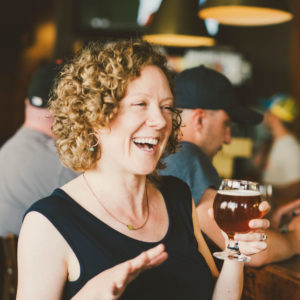
Lucy Burningham: I wrote about beer for six or seven years as a journalist, which meant I’d go deep on certain topics (like beer styles, ingredients, or brewing techniques) for a story. Then I’d move on to the next beer-related topic. At some point, I realized beer was the thing I had to know more about. I didn’t want to continue having a superficial knowledge of this beverage I loved so much. It was sort of a shocking realization for me as a generalist.
I knew that studying for the Certified Cicerone exam would give me the kind of framework I would need to really learn about all aspects of beer, from its history to how to serve it. And I liked that I’d need to develop my palate for the exam.
Tell us a little about what you do in the beer world now that you’re a Cicerone.
Last year, I came out with a book called My Beer Year, about my journey to become a Certified Cicerone. Since I learn best through experiences, I did things like brew with pros, travel to Belgium for the first time, and go to Yakima for the hop harvest. These days I still write about beer for a few publications, and I do things like help people plan private beer dinners at their homes, create beer pairing menus with chefs, and do TV spots where I talk about all sorts of beery things.
Living in Portland, you have one of the most amazing beer scenes in the country at your fingertips. What are some new-ish Portland breweries you’re excited about?
It’s so hard to keep up with the scene here! There are 70 breweries in Portland proper these days. I’m excited about Level Beer, which first won my heart with their dry-hopped pilsner. Little Beast Brewing is also making wonderful ales. I recently had Dream State, a foeder-aged ale made with strawberries, and it was a luscious combination of fresh strawberries, acidity, and barnyard funk.
Tell us about the process of turning this journey into a book. Was that always part of the plan when pursuing your certification, or did that happen along the way?
I’d done some studying for the exam before the book contract came to be, but the book project is what really launched me into serious study mode. I had to say goodbye to all the excuses for not studying I’d been muttering to myself (and friends and family) for years. There’s nothing like a deadline to kick things into gear!
You had some amazing experiences while writing this book, including taking a road trip around Belgium. Which trip or opportunity do you most wish you could have again?
Oh, to be in Belgium again! That trip really reshaped how I thought about beer, especially the relatively nascent American craft beer scene. It was so illuminating to be immersed in a culture that appreciates beer to such a high degree: the appropriate glassware for every beer at bars, the way beer is paired with food at restaurants. I just couldn’t get enough, and I hope to go back someday.
What do you see changing for better or worse in the American craft beer scene over the next five years?
I feel like the beer scene is changing so quickly, it’s hard to say what five years out will bring. Everyone keeps talking about the bubble: have we reached that tipping point, where consumers are oversaturated with craft beer options? And what is “craft beer,” anyway? Do most consumers care about who owns breweries and how “independent” that makes them? These are the questions that will be answered during the next five years.
What advice would you give a person who reads My Beer Year and decides they want to become a Cicerone?
Go for it! It’s such an incredible experience. If you really commit to studying for the test, go for it and don’t look back. Think about what kind of experiences will help you learn. Maybe making a batch of homebrew every weekend is your ticket. Or doing formal style tastings with your friends on Sunday nights. If you have a photographic memory, read a bunch of books. Do things like cancel your Netflix subscription and buy a lot of blank flashcards. There will be things you’ll need to sacrifice to pass this exam.
Finally, the most important question of all: which beers have you most been enjoying lately?
‘Tis the season for some of my favorites, including the classic Ayinger Celebrator doppelbock. I mean, who doesn’t need more little plastic goats hanging from the Christmas tree? I also recently pulled a bunch of vintage Deschutes Jubelales from my cellar and did a vertical. It’s always interesting to see how beers change over time, and a few of the more recent years held up quite nicely. Also, I can’t stop drinking pilsners. I don’t care how cold it is outside.




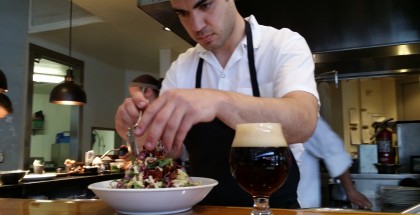
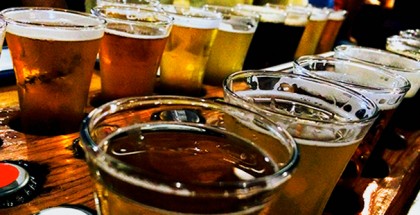
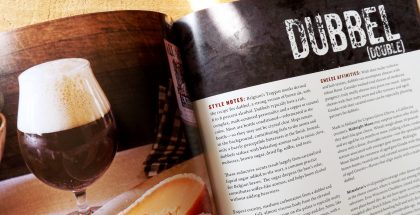
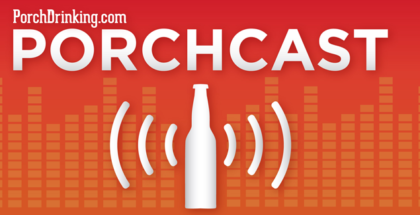

Submit a Comment